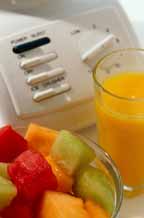
Selling Fruit Juices
By Bridget Rabo Ng
P10,000 is all you need to set up a home-based juice bar. Raise P500,000 and you can move into a mall.
The increasing demand for healthy food is creating more opportunities for people to go into business, and one of the least expensive but potentially lucrative ventures to start is selling fresh fruit juices. Supply is no problem: The Philippines has 11.3 million hectares of farmland devoted to fruits, vegetables, and other crops, and you could start with as little as P10,000, says Jennifer Tutanes, a resource person with the government-run Technology and Livelihood Resource Center and a food technology professor with the University of Makati.
Indeed, P10,000 would be enough to buy fruits, cups, straws, and a blender and let you set up a home-based business. P500,000 allows you to buy industrial equipment (juice extractors, chillers and refrigerators), train your staff, and set up in a mall or corporate center with enough money left over to finance your business for six months. "Your store may be two to 10 square meters depending on your location," says Tutanes. Make sure it's clean, your juice bar has a sink, and you have a stable surface for blending or juicing fruits. Yourself aside, have at least one employee who's familiar with fruits and know how to peel and slice them.
'Divisoria is still the best place to buy all the fruits you'll need, but make sure you're there between 7:00 p.m. and daybreak to get the fresh deliveries.'
If you must buy in bulk, get your fruits from the places they're abundantly produced (strawberries from Bagiuo, lanzones from Laguna, pomelo from Davao, etc.), otherwise get them from the wet markets and wholesale outlets such as Shop Wise, S & R, and Makro. Divisoria is still the best place to buy all the fruits you'll need, but make sure you know fruit prices and you're there between 7:00 p.m. and daybreak to get the fresh deliveries. If you haven't heard, a study by the Bureau of Agricultural Statistics in November 2005 says mangoes cost P51.25 a kilogram wholesale and P70 retail, and bananas (lakatan) P19 a kilogram wholesale and P28 retail. Oranges, apples, and pineapples are sold by the piece: oranges and apples at P12 to P15 each, and pineapples at P12 to P25 each depending on size and the season. Cultivate different suppliers to get people who will always put their best fruit forward.
Your big challenge is convincing people to buy your juices. Consumer awareness of healthy drinks is increasing, but many people-wage earners particularly-are fairly set on the amount of money they'll pay for a drink. Fruit juices are a bit expensive at around P40 a cup, so a customer with not much to spare will always pick soda-as little as P6 a bottle-to slake his thirst. Alan Escalona of Fruit Magic aimed at the upper-C-to-A segment to make sure he had customers. "These are the people who read a lot and understand the benefits of fruit drinks," he says. And to widen his market, he tied up with gyms, corporate buildings, and call center companies whose employees need health drinks the most.
If you can't target gyms, corporate buildings or call centers, try to set up in a mall or within a private school attended by your target customers. Watch your inventory. "Never stock too many fruits since you want them always fresh", says Tutanes. And the best way to preserve fruits is to freeze them at temperatures below 10 degrees, says Escalona, instead of chilling them at five to six degrees. You'll also need to know how much to stock in your outlet. Escalona knows how many cups each of his branches uses each day, so he's able to pre-weigh and pre-pack his fruits before sending them out, and to audit the cups and straws in each outlet.
Fruit Magic, The Big Chill, and Fruitas are the main players in the fresh juice market, but the sector is far from saturated. Indeed, the market is wide open, and anyone with a modest starting capital may join it and thrive by picking a good location and getting the best fruits at the best prices. Indeed, an entrepreneur investing P100,000 in a juice bar and setting up inside a campus may expect to recover his or her investment in six months, says Tutanes.
Fruit Magic Co. Inc.
Tel: (632) 364-6927, 364-3621
email: contact@fruitmagic.com.ph
Technology and Livelihood Resource Center
Trunkline: (632) 637-4018 to 22
Handyware Philippines Inc.
Tel: (02) 426-2888
email: sales@ handyware.net.ph
IAJ Corp
Tel: (02) 3737396
email: matstone@iajcorp.com
Source: Entrepreneur Philippines
Related article
The Philippine Fresh and Processed Food Industry - The Philippines has competitive advantage in terms of availability of raw materials for processing, suitability of climate and soil fertility to grow a wide variety of agricultural products. Many enterprises operate manual and semi-mechanized systems. Some are gearing towards a fully automatic system to minimize labor input, contamination and waste. Others however, continue to be semi-automated to take advantage of the country’s large and skilled labor pool, as well as to limit investments in capital equipment.
No comments:
Post a Comment